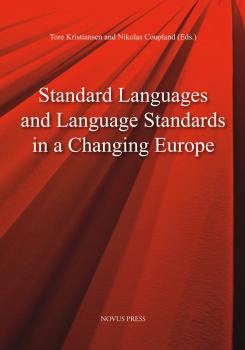Standard Languages and Language Standards in a Changing Europe
Synopsis
This book is the first publication from the international group of researchers involved in developing the SLICE programme, SLICE being an acronym for Standard Language Ideology in Contemporary Europe.
SLICE is interested in ideologies of language as much as in the forms and functions of languages themselves, and in exploring how ideology can be made visible by different research methods. This implies a commitment to researching the attitudes and value-structures that underpin attributions of ‘standard’, potential subjective complexities and shifts in these subjectivities.
One of SLICE’s key objectives is to make informed assessments of the extent and nature of linguistic destandardisation in contemporary European contexts. While sociolinguistic attention has so far been given to standardising processes – the mechanisms by which language varieties ‘rise’ to function ideologically and practically as standard varieties – it is also necessary to move beyond linear accounts and to explore whether and how varieties that have functioned as standards may be losing their legitimacy. Is there evidence that ways of speaking that have been positioned as ‘non-standard’ or vernacular varieties are ‘moving up’ to function in domains previously associated with standard varieties? More radically, is there evidence that the ideological systems that have supported attributions of standard and vernacular language may be crumbling, losing their potency or being restructured? Is it appropriate to see late modernity as an era when linguistic standardisation is in some ways and in some places being reversed, or at least rendered more complex and multi-dimensional?
Chapters
-
Acknowledgements
-
SLICE: Critical perspectives on language (de)standardisation
-
Standard language in Austria
-
Language and ideology in Denmark
-
English in England and Wales: Multiple ideologies
-
De-standardisation in progress in Finnish society?
-
Ideologies of standardisation: Finland Swedish and Swedish-language Finland
-
Language variation and (de-)standardisation processes in Germany
-
Language ideology and standardisation in Iceland
-
The perception of Standard Irish as a prestige target variety
-
Language ‘nationalisation’: One hundred years of Standard Lithuanian
-
The standard language situation in The Netherlands
-
Language culture in Norway: A tradition of questioning standard language norms
-
Standardisation and standard language in Sweden
-
Standardness and the Welsh language
-
Language change and digital media: A review of conceptions and evidence
-
Demotisation of the standard variety or destandardisation?The changing status of German in late modernity (with special reference to south-western Germany)
-
Leaving Home: in a post-colonial variety of broadcast news language
-
A perceptual typology of standard language situations in the Low Countries
-
The view from the couch: Changing perspectives on therole of television in changing language ideologies and use

Downloads
Forthcoming
Categories
License

This work is licensed under a Creative Commons Attribution-ShareAlike 4.0 International License.

